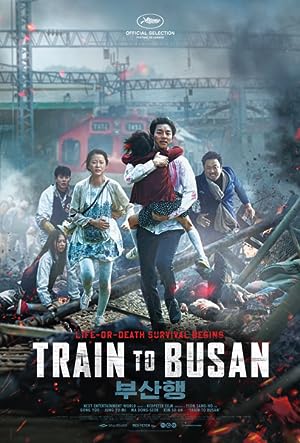Train to Busan is a South Korean zombie movie with the goals of a 1970s American disaster flick like The Poseidon Adventure. Train to Busan uses an ensemble cast to transform every day people into self-sacrificing heroes for the ones that they love, specifically the future. Train to Busan is definitely better than Snakes on a Plane because it is zombies on a train. Jokes aside, Train to Busan is not just another empty zombie action movie, but is layered with greater significance if one digs deeper. There are subtitles, and it is violent so it is not for all viewers. I also thought that Train to Busan needed to shorten the length of the film, and even though some of the deaths were noble, they seemed unrealistically dramatic after everything that the characters had survived before the fatal blow.
Train to Busan uses a World War Z style zombie outbreak as a metaphor for class warfare and how the people on Wall Street exploit and dehumanize everyone else until they destroy society, and nothing is functional. The only ones who can discern the destruction are not those who caused it, but the most vulnerable segments of society: children, homeless people, adolescents, and elderly women. The affluent just dismiss it as mindless violence or do not notice anything out of the ordinary even if it is completely obvious. The middle class is most vulnerable to the outbreak because they are conditioned to look to authority figures for guidance. Both the government and business sector treat the general public one way and keep the real information to themselves, which ends up privileging no one and exacerbates the situation.
I am not an expert on Korean history, but Busan as a destination for survivors in a time of crisis has long term historical, sociological and economic significance for South Korea. Busan was at the front lines during the Japanese occupation of Korea, the only city to have a tramway until railways adopted electric power and was one of two cities never occupied by North Korea. If Western style, Wall Street exported class warfare caused the zombie outbreak, then Train to Busan is also a call to reject this imperialistic business style, return to South Korean values and to stand against the barbarians at the gate. Train to Busan hammers the point home by making the journey a struggle for the soul of a father and hedge fund manager between the inexplicably awesome, burly and smartly dressed expectant father, Sang-hwa, and CEO Yon-Suk, a selfish villain/manchild who is incapable of showing even the slightest empathy towards others. Even though the hedge fund manager is trying to be a better father and take his daughter to her mom, the outcome is not completely certain. The road to redemption is as long as the Snowpiercer train.
Train to Busan’s most chilling moment for me was when the hedge fund manager is talking to his infected mom on the phone, and she uncharacteristically starts calling her ex-daughter in law every name in the book. Usually she is just quietly supportive of her son, but silently sad. We don’t see her transform, but Train to Busan occasionally showed the point of transformation and how it reveals someone’s true character. If you had some bad things tucked away in your soul, call an exorcist.
Train to Busan is a zombie parable with a patriotic call to reject the barbaric invasion from the West and return to South Korea’s heroic and past prosperous origins by returning to their ancestral values. If you are into zombie flicks, definitely check it out, but remember that I warned you that The Train to Busan needed more editing.
Stay In The Know
Join my mailing list to get updates about recent reviews, upcoming speaking engagements, and film news.





